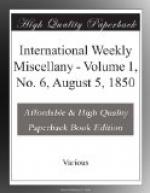“FITZ-GREENE HALLECK is also a New-Englander by birth and a New Yorker by adoption. He is Bryant’s contemporary and friend, but the spirit and style of his versification are very different; and so, it is said, are his political affinities. While Bryant is a bulwark of the Democracy, Halleck is reported to be not only an admirer of the obsolete Federalists, but an avowed Monarchist. To be sure, this is only his private reputation: no trace of such a feeling is observable in his writings, which show throughout a sturdy vein of republicanism, social and political. In truth, the party classification of American literary men is apt to puzzle the uninitiated. Thus Washington Irving is said to belong to the Democrats; but it would be hard to find in his writings anything countenancing their claim upon him. His sketches of English society are a panegyric of old institutions; and the fourth book of his Knickerbocker is throughout a palpable satire on the administration of Thomas Jefferson, the great apostle of Democracy. Perhaps, however, he may since have changed his views. Willis, too, the ‘Free Penciler,’ who has been half his life prating about lords and ladies, and great people, and has become a sort of Jenkins to the fashionable life of New York; he also is one of the Democratic party. Peradventure he may vote the ‘Locofoco ticket’ in the hope of propitiating the boys (as the canaille of American cities are properly called), and saving his printing-office from the fate of the Italian Opera House in Astor Place. But what shall we say of Cooper, who, by his anti-democratic opinions, has made himself one of the most unpopular men in his country, and whose recent political novels rival the writings of Judge Haliburton in the virulence as well as the cleverness of their satire upon Republican institutions? He, too, is a Democrat. To us, who are not behind the curtain, these things are a mystery incapable of explanation. To return to our present subject. Halleck made his debut in the poetical world by some satirical pieces called The Croakers, which created as much sensation at their appearance as the anonymous Salmagundi which commenced Irving’s literary career. These were succeeded by Fanny, a poem in the Don Juan metre. Fanny has no particular plot or story, but is a satirical review of all the celebrities, literary, fashionable, and political, of New York at that day (1821). And the satire was probably very good at the time and in the place; but, unfortunately for the extent and permanence of its reputation, most of these celebrities are utterly unknown, not merely beyond the limits of the Union, but beyond those of New York. Among all the personages enumerated we can find but two names that an European reader would be likely to know anything about,—Clinton and Van Buren. Nay, more, in the rapid growth and change of things American, the present generation of New Yorkers are likely to lose sight of the lions




